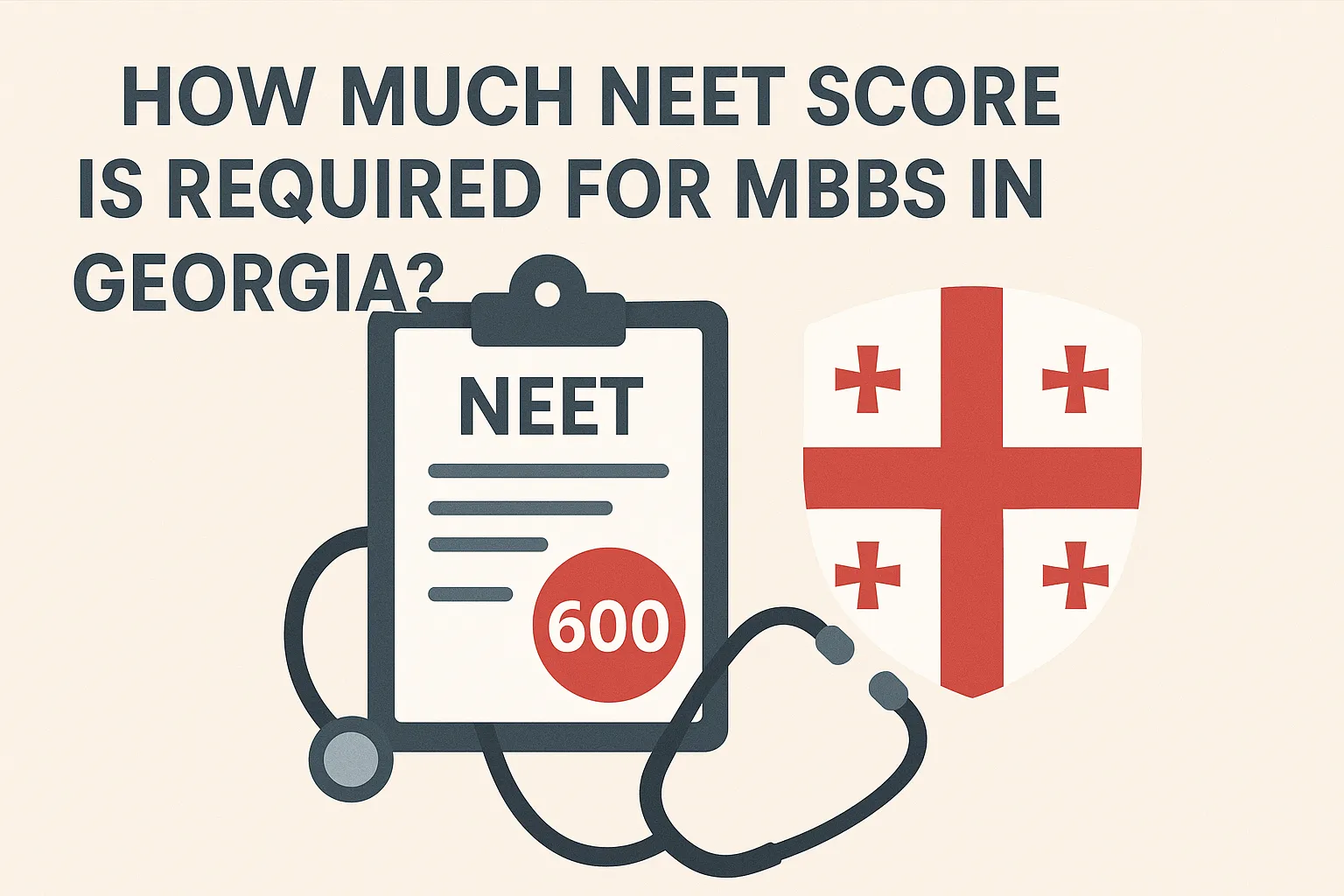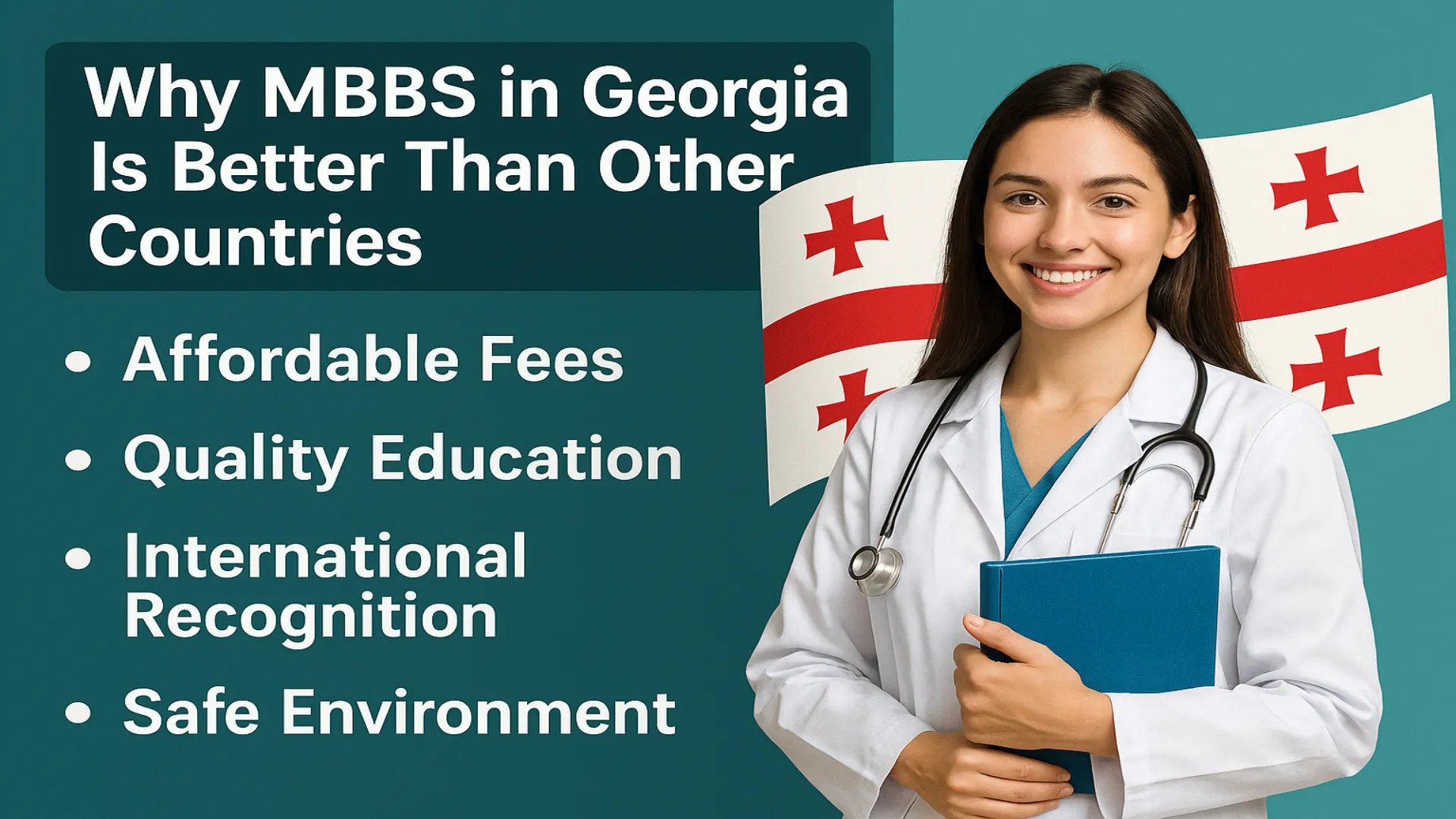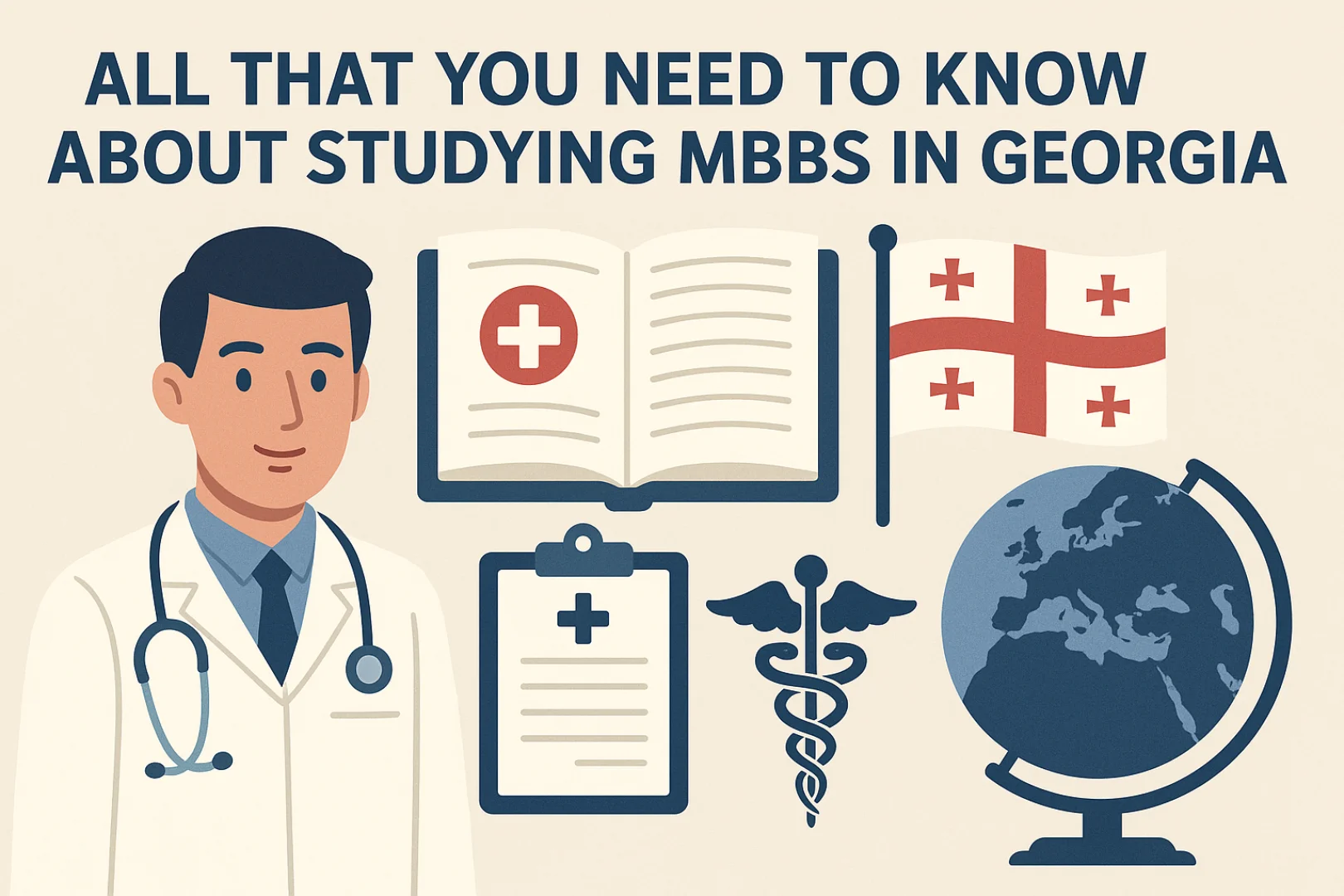
Top 5 Medical Universities in Georgia
2. Low tuition and cost of living
3. Globally recognized degrees
4. Safe and comfy Encouraging place
5. English medium of instruction
Eligibility Criteria for MBBS in Georgia
To get admission to MBBS in Georgia, Indian students must meet the following eligibility requirements:
|
Criteria |
Details |
|
Minimum Age |
17 years (as of 31st December in the admission year) |
|
Academic Background |
10+2 with Physics, Chemistry, Biology, and English |
|
Minimum Marks |
50% in PCB (40% for reserved categories) |
|
NEET |
Mandatory as per Indian Medical Council guidelines |
Course Duration and Curriculum
The MBBS program in Georgia is a 6-year course, which includes one year of internship. The course is designed to provide theoretical knowledge along with practical clinical experience.
|
Year |
Focus Area |
|
1st – 2nd |
Basic sciences and pre-clinical studies |
|
3rd – 5th |
Clinical studies and hospital rotations |
|
6th |
Internship and practical exposure |
Top 5 Medical Universities in Georgia
Here are some of the top-ranked and student-preferred medical universities in Georgia:
|
University Name |
City |
Approx. Annual Tuition (USD) |
|
Tbilisi State Medical University |
Tbilisi |
$8,000 |
|
Grigol Robakidze University |
Tbilisi |
$5,700 |
|
Batumi Shota Rustaveli State University |
Batumi |
$4,000 |
|
European University |
Tbilisi |
$5,000 |
|
New Vision University |
Tbilisi |
$7,000 |
Note: Tuition fees may vary depending on currency exchange rates and university updates.
How to get admission in MBBS in GeorgiaRequired Documents
Here’s a list of commonly required documents for MBBS admission in Georgia:
|
Document |
Requirement |
|
10th and 12th Mark Sheets |
Scanned copies |
|
NEET Scorecard |
Mandatory for Indian students |
|
Passport |
Valid passport |
|
Passport-sized Photographs |
Recent, white background |
|
Medical Fitness Certificate |
Issued by a registered practitioner |
|
COVID-19 Vaccination Certificate |
Mandatory for most universities |
Cost of Living in Georgia
In addition to tuition fees, students should also consider monthly living expenses. Georgia is relatively affordable for international students.
|
Expense Type |
Estimated Monthly Cost (USD) |
|
Accommodation |
$200 – $400 |
|
Food & Groceries |
$150 – $250 |
|
Transport |
$30 – $50 |
|
Miscellaneous |
$100 – $200 |
|
Total Estimate |
$480 – $900 |
Note: Costs depend on location and lifestyle preferences.
Recognition of MBBS Degrees from Georgia
Degrees obtained from medical universities in Georgia are recognized by major global organizations and allow graduates to practice medicine or pursue higher education in various countries.
Recognized by:
- National Medical Commission (NMC) – India
- World Health Organization (WHO)
- Educational Commission for Foreign Medical Graduates (ECFMG) – USA
- Foundation for Advancement of International Medical Education and Research (FAIMER)
- General Medical Council (GMC) – UK (for selected universities)
Advantages of Studying MBBS in Georgia
|
Feature |
Benefit |
|
Affordable Education |
Lower tuition and living costs |
|
No Donation Required |
Transparent fee structure |
|
English-Medium Programs |
No need to learn a new language |
|
Globally Recognized Universities |
Career options in India and abroad |
|
High Safety Standards |
Peaceful and secure environment |
|
Modern Infrastructure |
Labs, libraries, hostels, and classrooms |
Core Subjects Covered in MBBS Curriculum
The MBBS curriculum in Georgia spans a wide range of medical and allied subjects. Students study both foundational sciences and clinical subjects. Here's a detailed list:
|
Pre-Clinical and Para-Clinical Subjects |
Clinical & Advanced Medical Subjects |
|
Human Body – Structure and Function |
Internal Medicine |
|
Biochemistry |
Surgery |
|
Genetics and Molecular Biology |
Obstetrics and Gynecology |
|
General Microbiology and Bacteriology |
Pediatrics |
|
General Hygiene and Ecology |
Emergency Medicine |
|
Virology, Mycology, and Parasitology |
Anesthesiology and Resuscitation |
|
Immunology and Clinical Microbiology |
Dermatology |
|
Pathology (Basic and Clinical) |
Psychiatry and Clinical Psychology |
|
Clinical and Research Skills |
Oncology |
|
Epidemiology, Biostatistics, and Public Health |
Neurology |
|
Sociology of Health and Illness |
Hematology and Transfusion Medicine |
|
Introduction to Psychology |
Cardiovascular Surgery |
|
Basic Pharmacology and Clinical Pharmacology |
Family Medicine (Basic and Advanced) |
|
Bioethics and Medical Law |
Reproductive Medicine |
|
Health Promotion and Disease Prevention |
Palliative Care |
|
Radiology Basics |
Infectious Diseases |
|
Medical Informatics and Telemedicine |
Clinical Decision-Making and Differential Diagnosis |
|
Health Care Management and Safety |
Forensic Medicine |
|
SPSS & Data Analysis in Health Care |
Alternative Medicine Basics |
|
Medical Tourism and Planning in Healthcare |
Small Clinical Research Projects |
Practical Training in MBBS (Georgia)
Practical exposure is a key part of the MBBS program in Georgia. Here’s how hands-on training is structured:
|
Semester |
Focus Area |
|
1st to 5th Semester |
Focuses on theoretical and non-clinical subjects. Limited practical exposure. |
|
From 6th Semester |
Core clinical training begins in hospitals. |
|
Includes rotations in Medicine, Surgery, Gynecology, Pediatrics, etc. |
|
|
Students observe live surgeries and engage in real clinical procedures. |
Students typically train in university-affiliated hospitals, gaining real-time experience in handling patients under expert supervision.
MBBS Intake Timeline in Georgia for Indian Students
Indian students looking to pursue MBBS in Georgia should note that the academic intake typically begins around the end of September or early October each year. It is important to apply early to secure a seat in your preferred university.
Below is the estimated timeline for the MBBS admission process:
|
Stage |
Tentative Timeline |
|
Application Start Date |
December 2024 or January 2025 |
|
Last Date to Apply |
August 2025 |
|
Classes Begin |
Late September or Early October 2025 |
Note: These dates are approximate and may vary slightly depending on the specific university. Students are advised to regularly check the official website of the chosen medical university for the exact deadlines and updates.
Career Opportunities after MBBS in Georgia
1. By successfully graduating from Georgian medical universities, a student can enter a wider and broader career path
2. Pass the Foreign Medical Graduate Exam (FMGE), and then practice in India.
3. Applying for USMLE examinations and furthering practice in the USA
4. Pass the PLAB exam and then practice in the UK
5. Post-graduation studies in Europe or other countries
6. Georgian students can work in Georgia or one of the other CIS countries.
Tips for Students
1. Check whether the university is accredited by NMC.
2. Learn the local Georgian for daily convenience.
3. Join other Indian students and help each other.
4. While studying, reserve a place at a FMGE prep course.
5. Back up all these documents digitally and keep a hard copy.
Subscribe for 2025 Updates!
Latest Blogs
Read MoreBecome a member and stay up to date with our favorite topics and publications.





